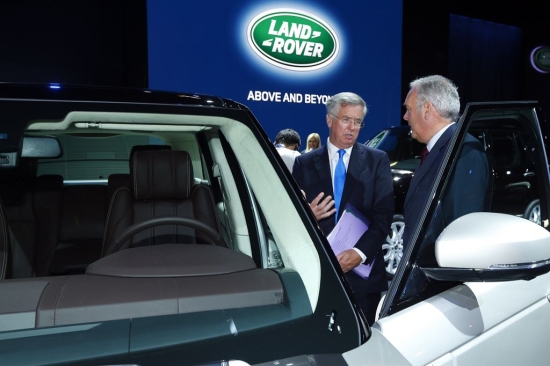UK car manufacturing is quickly becoming one of the most successful industries in the country at present, with many multinational brands choosing to invest in British plants as a means of fuelling quicker and more efficient production.

In the past year alone, companies such as Vauxhall, Jaguar and Toyota have increased cash flow into their UK production sites, often choosing to expand existing plants and increase employee numbers in a bid to cash in on an increasing international market for luxury vehicles.
This week, Land Rover has announced its intention to implement a seven year plan with the expectation of doubling vehicle production by 2020. This investment is part of a £10 billion cash injection by Jaguar Land Rover into the company’s UK production sites, and is believed to be paving the way for the creation of a new model of Range Rover.
The expansion in production is rumoured to be due to Land Rover’s plans to revamp their range somewhat. Apparently, this will include 16 different variations of existing Land Rover models – six luxury Range Rovers, five upgraded versions of the iconic Defender model and five altered Freelander and Discovery variations.
More details on this 16 car line up are as yet unconfirmed, but were inadvertently leaked to the press by design director Gerry McGovern during a power point presentation on the features of the new Range Rover, which will go on sale early next year. Of course, this leak has hardly damaged the future for Land Rover, as car industry experts are now speculating wildly upon the exact specifications of the updated models.
The Range Rover Evoque has proven particularly popular, being a luxury four wheel drive, and it appears that Land Rover wish to expand upon this success by creating a soft top version, as well as creating an even smaller version of the “baby” Range Rover.
Additionally, in keeping with the theme of scaling down, a smaller version of the Freelander is said to be in the pipeline, as well as a new generation of Discovery which will focus on luxury rather than the traditional ruggedness usually associated with the model. Finally, the Defender’s next generation will come in a variety of five and seven seat models, and will even include a pick-up truck with seating in the cab area if rumours are to be believed.
Of course, a boom in vehicle production can only be a good thing for skilled workers in the UK, especially as a significant portion of the investment made by Jaguar Land Rover will be channelled directly into the expansion of their sites in this country.
Their plant in Solihull, for example, will have to be modernised and greatly increased in size in order to keep up with growing demand, as it manufactures the Range Rover, Defender and Discovery models – all of which are expected to be altered and diversified in the coming years.
Furthermore, the Halewood factory in Merseyside is responsible for the production of the Range Rover Evoque and Freelander range, meaning that it, too, will require significant expansion if Land Rover is to meet its targets by 2020.
While Land Rover refused to comment on the seven year expansion plan, associate editor of Autocar magazine Hilton Holloway has been briefed by sources within the company and has gained an insight into the future of this iconic company.
He says; “Land Rover is on a roll. It is almost certainly the biggest investment that the UK car industry has ever seen.
“The new production line at Solihull could produce 150, 000 models per year at full stretch.
“With the new Range Rover shifting just over 40, 000 units and the Sport about 60,000, it leaves room for a range topping aluminium Land Rover in a luxury segment that should be able to steal 50, 000 of the 682, 000 global sales.”
The overall aim of this expansion plan is to allow Land Rover to become a major influence in the global sports utility vehicle market. Experts predict that, by 2020, this category will sell 22 million cars per annum – and Land Rover hope that their products will account for 3 per cent of this total.
Yet European sales are unlikely to allow the company to reach this target. Due to the Eurozone crisis, sales on luxuries are down, and even in recovering Britain a new car is something that many families would be unable to afford at present.
This is why a further portion of the investment made by Land Rover will be channelled into expanding its network of dealerships in China. Currently, the company operates 96 dealerships within the country, but there are hopes to expand this number by 47 in order to take full advantage of the growing Chinese market for luxury cars. Clearly, this is a method which is likely to succeed, as in the first eight months of this year alone Land Rover sold nearly 50, 000 cars in the country.
However, in order for Chinese sales to grow, Land Rover must cater to a wider range of customers, as Mr Holloway explains.
He concluded; “Perhaps the biggest area where Land Rover can make headway is in the midmarket “leisure sector” where 6 million annual sales are up for grabs.
“As Land Rover’s future line up shows, it needs to build a family of cars in the sector where the current Freelander and Discovery compete.”
Do you think that this huge investment will see significant returns for Land Rover, or is the market simply too unstable for mass sales of luxury cars at the moment? Would you consider buying any of the future upgraded Land Rover models?